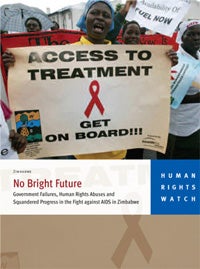 |
 |
 |
 |
Zimbabwe: July 2006 Human rights violations and inadequate health and social welfare policies are undermining progress in the fight against AIDS in Zimbabwe. Three thousand people die each week due to governmental policies that create formidable obstacles to accessing life-saving treatment. The prohibitively high costs of antiretroviral treatment and the government’s failure to inform HIV-positive individuals about the eligibility criteria for antiretroviral therapy have resulted in violations of people’s right to health. Women are among the most affected in Zimbabwe as they are often forced to engage in high-risk behaviors in order to survive and support their families, and are less able to independently find funds for treatment. After the government’s program of evictions in 2005, hundreds of people continue to live in appalling conditions, increasing the risk of HIV infection for thousands and further endangering the lives of those already infected. Zimbabwe, often hailed as a success story for a recent drop in HIV prevalence rates, continues to face an HIV/AIDS crisis that is driven by the government’s reluctance to implement equitable and non-discriminatory economic and social policies. “There’s no bright future because when you don’t know what you are going to eat tomorrow, there’s no future.” |
 |
“We’ll Kill You If You Cry: Sexual Violence in the Sierra Leone Conflict” Sierra Leone: January 2003 Throughout the 1991 to 2001 armed conflict in Sierra Leone, thousands of women and girls were systematically subjected to brutal sexual violence initiated predominantly by rebel forces, including individual and gang rape and rape with objects such as weapons, firewood, umbrellas and pestles. Many of the younger victims of such atrocities did not survive: some bled to death or suffered severe infections. Those who did survive were often abducted, subjected to sexual slavery by members of rebel forces, and put at risk of HIV infection. Though the war was declared over in 2002, an unknown number of these women and girls remained sexual slaves as of 2003, when Human Rights Watch published this report. There was no accountability for the thousands of sex crimes that were committed during the war, and few assistance programs existed to provide support to survivors. Victims not only lived with the severe physical and mental health consequences of the abuses suffered, but they also feared non-conflict-related sexual violence, largely perpetrated with impunity. Human Rights Watch called on international donors and nongovernmental organizations to work together with the government of Sierra Leone to establish programs to rehabilitate the survivors of sexual violence. “Then he said, ‘Well, tonight you are going to have sex, because you are going to be killed and you should do it before you die.’”– A.J., 14 year-old student, Pujehun, February 12, 2002 |
 |
“The War Within the War: Sexual Violence Against Women and Girls in Eastern Congo” June 2002 In violence-riddled Congo, rape was a weapon of war. Women and girls were continually and systematically sexually assaulted by members of the many warring militias, many of whom were infected with HIV/AIDS. And because war has ravaged this region intermittently since 1996, women were forced to flee their homes, seeking shelter in unfamiliar towns where they were increasingly subject to abuse by soldiers, police or government officials. A climate of impunity has prevented rape cases from being taken seriously, furthering a culture of violence that ostracizes rape survivors from their community and families. Unless this culture is addressed, women will continue to suffer sexual violence, and more will die. “Women are victims of the war. We don't take up arms but we, the women, suffer the most.” |
